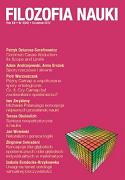Michaela Polanyiego koncepcja niejawnych przesłanek nauki
Michael Polanyi’s Idea of Tacit Premises of Science
Author(s): Iwo ZmyślonySubject(s): Philosophy
Published by: Uniwersytet Warszawski - Wydział Filozofii i Socjologii, Instytut Filozofii
Keywords: Polanyi; personal knowledge; tacit knowledge; tacit knowing; embodied knowledge; non-propositional knowledge; know-how; competence; epistemic skills; tacit premises; cognitive scheme; gestalt perception; paradigm switch; pattern cognition; intuition
Summary/Abstract: Tacit premises of science constitute researcher’s cognitive scheme, i.e. a set of a priori conditions of knowledge acquisition and application. Couple of assumptions make Polanyi’s idea considerably different than Kantian or behavioural or structural interpretations of cognitive scheme. He sees it more in hermeneutical or habitual terms — as system of (a) skills (dispositions to act), which (b) defines the level of competence; (c) cannot be verbally articulated; (d) is embodied (and hence unaware); (e) innate or acquired through practice — in master-pupil relations; (f) undergoes constant modifications when applied; (g) conditions both theoretical actions (eg. categorisation, acts of assertion), as well as practical (manual skills, acts of perception). The article contains analytical reconstruction of Polanyi’s views originally dispersed throughout all his major works. First two points describe structure and functions of premises — expounded within context of his model of mind and key distinction between subsidiary and focal awareness. Third point analyzes their personal status, focusing on disproportion between their pure functional (habitual) status and linguistic description. Points fourth and five characterise diachronic and synchronic aspects of cognitive scheme as well as closely connected idea of master’s authority and consensus within community of inquirers. Point six contains reconstruction of Polanyian idea of incommensurability and stability of cognitive schemes. Cognitive schemes outline the boundaries of scientific communities. Different schemes are mutually incommensurable in various degree. Main thesis of this conception is following: premises function solely in tacit mode, i.e. in pure habitual (embodied; indwelled; incorporated) fashion. We derive their existence from „meaningful wholes”, i.e. outcomes of our actions. Structure of skilfully performed actions (both theoretical and practical) can be reconstructed in strictly verbalized, methodological directives („explicit rules”). No rule however can be applied automatically in all possible cases of experience. Hence application of all methodological directives requires always some tacit premises. Paradigmatic outcome of tacit premises are introspective gestalt-type appearances. According to Polanyi these personal, theory-laden phenomena, distinguish competent researcher from a laymen. Most of them are „intuitive”, i.e. consist purely phenomenal and aesthetic content. Some of them contain additionally conceptual and propositional compounds which can be verbalised. Difference between the subjective „meaning” — i.e. a purely phenomenal, introspective content of gestalt-type perceptions, and „orthodox”, linguistic meaning, conveyed by words, remains vital for understanding of whole Polanyi’s epistemology.
Journal: Filozofia Nauki
- Issue Year: 20/2012
- Issue No: 4 (80)
- Page Range: 63-85
- Page Count: 23
- Language: Polish

